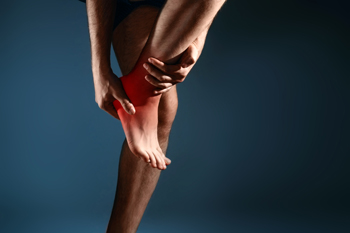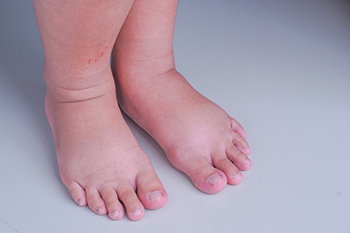Items filtered by date: June 2022
Say Goodnight to Nocturnal Muscle Cramps in Your Feet

It’s hard enough getting a good night’s sleep without muscle cramps in your feet keeping you awake. The nocturnal foot cramps you may be experiencing are actually contractions in the muscles or muscle fibers in your feet. Foot cramps occurring at night may be caused by muscle fatigue due to overtaxing the feet muscles, low levels of potassium (hypokalemia) or magnesium, medication side effects, pregnancy, or shoes that are too tight or that fail to provide adequate arch support. There are certain medical issues that may lead to nocturnal foot cramps, including arthritis, high blood pressure, diabetes, depression, thyroid disease, asthma, and heart attacks. Other contributing factors to developing these troublesome cramps are pregnancy, smoking, obesity, old age, and poor health. Consult with a podiatrist if your nocturnal muscle cramps do not improve within a couple of weeks to receive an accurate diagnosis and to discuss your treatment options.
Foot Pain
Foot pain can be extremely painful and debilitating. If you have a foot pain, consult with Harvey Jacobs, DPM from Quality Foot Care Center. Our doctor will assess your condition and provide you with quality foot and ankle treatment.
Causes
Foot pain is a very broad condition that could be caused by one or more ailments. The most common include:
- Bunions
- Hammertoes
- Plantar Fasciitis
- Bone Spurs
- Corns
- Tarsal Tunnel Syndrome
- Ingrown Toenails
- Arthritis (such as Gout, Rheumatoid, and Osteoarthritis)
- Flat Feet
- Injury (from stress fractures, broken toe, foot, ankle, Achilles tendon ruptures, and sprains)
- And more
Diagnosis
To figure out the cause of foot pain, podiatrists utilize several different methods. This can range from simple visual inspections and sensation tests to X-rays and MRI scans. Prior medical history, family medical history, and any recent physical traumatic events will all be taken into consideration for a proper diagnosis.
Treatment
Treatment depends upon the cause of the foot pain. Whether it is resting, staying off the foot, or having surgery; podiatrists have a number of treatment options available for foot pain.
If you have any questions, please feel free to contact our office located in Somerset, NJ . We offer the newest diagnostic and treatment technologies for all your foot care needs.
Do Your Child's Feet Hurt?
Pregnancy and Edema

When excess fluid gathers in the tissues of your feet and ankles and causes swelling, it is known as edema. Edema is an unpleasant side effect most women experience during pregnancy, becoming quite uncomfortable in the third trimester. Edema during pregnancy is caused by a number of factors. First, when a woman is pregnant, their body retains more fluids. Also, their growing uterus places pressure on veins in the lower extremities, which slows the rate of blood returning back to the heart. This can cause blood and fluid to pool in the tissues of their feet and ankles. Pregnant women dealing with edema would do well to make an appointment with a podiatrist. With exercise recommendations, compression stockings, custom orthotics, and other foot care, a podiatrist can be very helpful to any pregnant woman who is struggling with edema.
Pregnant women with swollen feet can be treated with a variety of different methods that are readily available. For more information about other cures for swollen feet during pregnancy, consult with Harvey Jacobs, DPM from Quality Foot Care Center. Our doctor will attend to all of your foot and ankle needs.
What Foot Problems Can Arise During Pregnancy?
One problem that can occur is overpronation, which occurs when the arch of the foot flattens and tends to roll inward. This can cause pain and discomfort in your heels while you’re walking or even just standing up, trying to support your baby.
Another problem is edema, or swelling in the extremities. This often affects the feet during pregnancy but tends to occur in the later stages.
How Can I Keep My Feet Healthy During Pregnancy?
- Wearing orthotics can provide extra support for the feet and help distribute weight evenly
- Minimize the amount of time spent walking barefoot
- Wear shoes with good arch support
- Wear shoes that allow for good circulation to the feet
- Elevate feet if you experience swelling
- Massage your feet
- Get regular, light exercise, such as walking, to promote blood circulation to the feet
If you have any questions please feel free to contact our office located in Somerset, NJ . We offer the newest diagnostic and treatment technologies for all your foot and ankle needs.
Facts About Foot and Ankle Fractures

A fracture, which is a break or crack in a bone, can vary greatly in type and level of severity. Symptoms of fractures include redness, swelling, pain, and difficulty/inability to bear weight. If you believe you have sustained a foot or ankle fracture, please seek medical help immediately. Among the types of fractures are displaced bone, stress fracture, pathological fracture, or compound or open fracture. A displaced bone fracture occurs when the broken ends of a bone move away from each other. Conversely, with a stress fracture the bone cracks but stays intact. A pathological fracture may be the result of a disease or condition that weakens the bone. Among the causes are cancer and osteoporosis. A fracture can occur simply as a result of ordinary daily activities, absent any extreme force or trauma. A compound fracture creates an open wound when the bone is pushed through the skin as the result of trauma. These are extremely serious fractures and it is suggested you get immediate attention as soon as possible. A podiatrist can examine, diagnose and treat it properly.
Foot and ankle trauma is common among athletes and the elderly. If you have concerns that you may have experienced trauma to the foot and ankle, consult with Harvey Jacobs, DPM from Quality Foot Care Center. Our doctor will assess your condition and provide you with quality foot and ankle treatment.
Foot and ankle trauma cover a range of injuries all over the foot; common injuries include:
- Broken bones
- Muscle strains
- Injuries to the tendons and ligaments
- Stress fractures
Symptoms
Symptoms of foot and ankle injuries vary depending on the injury, but more common ones include:
- Bruising
- Inflammation/ Swelling
- Pain
Diagnosis
To properly diagnose the exact type of injury, podiatrists will conduct a number of different tests. Some of these include sensation and visual tests, X-rays, and MRIs. Medical and family histories will also be taken into account.
Treatment
Once the injury has been diagnosed, the podiatrist can than offer the best treatment options for you. In less severe cases, rest and keeping pressure off the foot may be all that’s necessary. Orthotics, such as a specially made shoes, or immobilization devices, like splints or casts, may be deemed necessary. Finally, if the injury is severe enough, surgery may be necessary.
If you have any questions, please feel free to contact our office located in Somerset, NJ . We offer the newest diagnostic and treatment technologies for all your foot care needs.
Does My Ankle Fracture Need Surgery?

An ankle fracture can happen from suddenly twisting your ankle. This can happen from falling, or possibly from stepping off of a curb unexpectedly. The ankle ligaments may be affected, and surgery may be needed for permanent repair. A surgical benefit can consist of putting the bones back together in proper formation for proper healing. When this is done correctly, treatment can begin by using a walker or cast. During ankle surgery, the broken bones will be exposed on the inner and outside of the ankle. Screws and plates may be used to permanently hold the bones together, and can generally take several weeks to recover. After an appropriate time has passed, it is beneficial to perform specific exercises that can help to strengthen the ankle after surgery. Recovery typically begins with resting the affected ankle on a pillow, and it may help to keep it elevated which can diminish existing swelling. If you have broken your ankle, it is strongly suggested that you contact a podiatrist who can offer you correct treatment options, which may include surgery.
Foot surgery is sometimes necessary to treat a foot ailment. To learn more, contact Harvey Jacobs, DPM of Quality Foot Care Center. Our doctor will assist you with all of your foot and ankle needs.
When Is Surgery Necessary?
Foot and ankle surgery is generally reserved for cases in which less invasive, conservative procedures have failed to alleviate the problem. Some of the cases in which surgery may be necessary include:
- Removing foot deformities like bunions and bone spurs
- Severe arthritis that has caused bone issues
- Cosmetic reconstruction
What Types of Surgery Are There?
The type of surgery you receive will depend on the nature of the problem you have. Some of the possible surgeries include:
- Bunionectomy for painful bunions
- Surgical fusion for realignment of bones
- Neuropathy decompression surgery to treat nerve damage
Benefits of Surgery
Although surgery is usually a last resort, it can provide more complete pain relief compared to non-surgical methods and may allow you to finally resume full activity.
Surgical techniques have also become increasingly sophisticated. Techniques like endoscopic surgery allow for smaller incisions and faster recovery times.
If you have any questions please feel free to contact our office located in Somerset, NJ . We offer the newest diagnostic and treatment technologies for all your foot and ankle needs.

